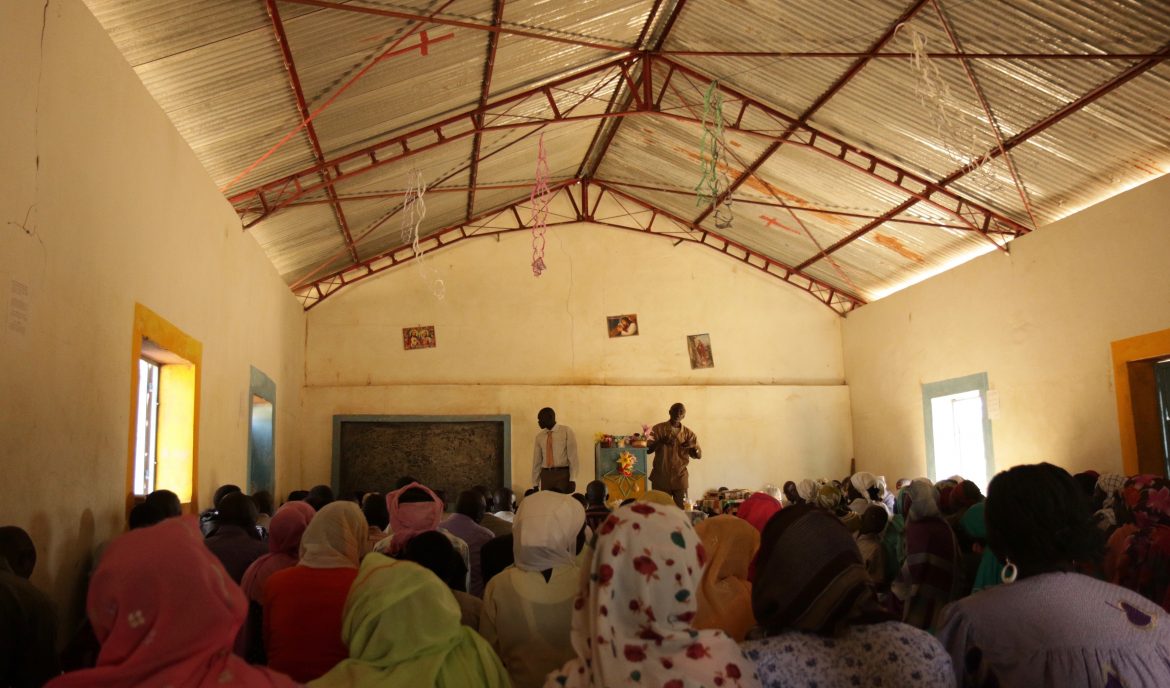It was unexpected but much welcomed news. On May 11, Sudan President Omar Al-Bashir pardoned Pastor Hassan Abdulrahim from the Nuba Mountains, along with a Darfur activist, Abdulmoneim Abdelmoula.
After spending 17 months in several prisons, the two were released early from a 12-year sentence facing charges of undermining the constitution, espionage and spreading false information, their defense lawyer Muhanad Nur told Nuba Reports.
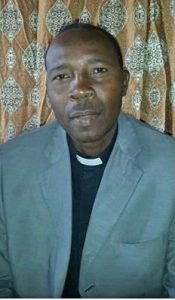
Pastor Hassan Abdelrahim (Morningstar News)
Abdulrahim came out of Kober prison, a facility in the capital of Khartoum used to lock up political opponents and terrorists alike. “It’s hard to remain in prison all that time, especially when we think about our families,” Abdulrahim told Nuba Reports. “But it was also a good experience for us – to help build up the church in prison and encourage parishioners.”
The targeting of churches and Christians ratcheted up after South Sudan gained independence in 2011. Once the predominantly Christian South Sudanese populace seceded, those Christians remaining within the country had less institutional support and protection against state authorities. In April 2013, the Minister of Guidance and Endowments announced that no licenses would be granted for building new churches in Sudan, citing a decrease in the South Sudanese population. Two years later, government officials stiffened penalties for apostasy and blasphemy.
“Christianity is not welcome in Sudan,” said Nur who routinely defends Christian cases in court, including the Sudan apostasy hearings against Meriam Yahia, now in the United States. “It seems as if every week I am hearing about another case of Christians being persecuted here.”
In Nur’s latest case, the accused’s sentences were largely based on their association with a Christian aid worker from the Czech Republic, Petr Jasek. Authorities arrested Jasek around the same time as Abdulrahim and Abdelmoula along with another Nuba pastor, Kuwa Shamal, who was released in late 2016 for lack of evidence.
In October 2016, state prosecutors presented video footage and photographs taken from Jasek’s laptop as evidence. The prosecutor’s case included footage Jasek took interviewing Christians in the Nuba Mountains. The state evidence also included evidence of the four suspects assisting a student and Christian convert who suffered skin burns from a teargas bomb during a 2013 university protest.
“They were monitoring me,” Jasek told Nuba Reports upon his release. “They [Sudan’s security agents] showed photos of all the meetings I had with church members. There were even night photos –they were monitoring every step.”
But the heavy state surveillance hardly produced any criminal offence.
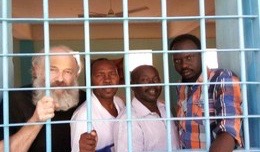
Four Christians jailed without charge (Hudo)
“Despite being locked up for over a year, the whole legal process was actually six months,” Jasek said. “It took them [state prosecutors] about three months to raise their concerns and then our lawyers were able to destroy their accusations in three hours.”
Despite a weak case against Jasek, Sudan only released him in February after a visit to Khartoum by the Czech Foreign Minister Lubomir Zaoralek.
All four faced considerable duress, shifting to several different prison facilities during their incarceration.
“I was in five different prisons in total,” Jasek said. “Usually the transfer meant that conditions were going to be even worse.”
At one state, Jasek was placed in a cell with Islamic State fighters who would beat and torture him. One of the fighters from Libya boasted that he had beheaded 20 Coptic Christians in Libya and carried a fishing line that “could kill anyone in seconds,” Jasek said during a press conference after his release.
Christian leader killed, another church demolished
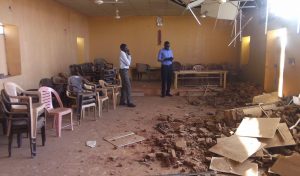
Soba Al-Radi Church destroyed (James Younis)
Just days before the president pardoned Abdelrahim and Abdelmoula, Khartoum state authorities destroyed another church 19 kilometers outside the capital in Soba al-Radi. Authorities under the Ministry of Planning and Development bulldozed the church on a Sunday, May 7, as Christians prepared to worship. The government said in a statement the church was built on land allocated for residential use. The church is among 25 other churches the state has marked for demolition in a June 2016 letter, claiming they were all built on land zoned for other purposes.
But according to Pastor Elias Abdelrahim, who manages the Soba al-Radi Church, the building was first built on empty land in 1986 and they have been trying to attain legal documentation ever since. Nur, who also represents the now demolished church, said the government had provided land registration certificates for several mosques in the area but not the church – despite its long tenure. Nur had filed a 15-day abstention with the court of appeal to block the church’s demolition but the government ignored the court order.
“Now we gather at the church’s yard to pray, because we fear the remains of the building may fall on our heads”
–Pastor Elias Abdelrahim, Head of Soba Al-Radi Church
Three congregations used to attend Soba Al Radi Church since it was the only church in the area following the demolition of 12 other church buildings over the past six years, news reports said. Sometimes over 200 people would pray there, Abdelrahim said.
“Now we gather at the church’s yard to pray, because we fear the remains of the building may fall on our heads,” he said.
The U.S. Embassy Chargé d’Affaires Ervin Massinga visited the demolition site.
“This is a very sad and regrettable situation,” Massinga said in a short video. “Religious freedom and rule of law go hand-in-hand. Yes, rule of law is important, but without religious freedom, it is hollow.”
The parliamentary chairman of Sudan’s Legislation and Justice Committee, Ahmed El Tijani, defended the demolition in a statement, claiming the move was purely for land ownership reasons and not based on religious discrimination.
A month earlier, a group raided the Evangelical School of Sudan to quell a protest and killed church elder Yunan Abdullah. The April raid represented another move by Sudanese authorities to grab church land for investment, the Sudanese human rights Sudan Democracy First Group reported.
An armed group supported by Sudan’s ministry of guidance and endowments attacked civilians at the Evangelical School Christians who had staged a protest against the attempted seizure of the building, local sources told Nuba Reports. Abdullah had rushed over to the Evangelical School from the neighboring Bahri Evangelical Church to help defend the protestors against the armed group. One of the members of this group stabbed Abdullah, who died of his injuries in a nearby hospital. Abdullah is survived by his wife and two children.
Why target Christians now?
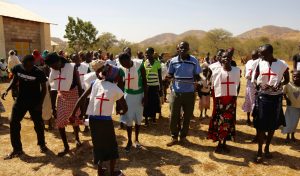
A church group in the Nuba Mountains (Nuba Reports)
This state persecution of Christians appears at loggerheads with the October conclusions of the National Dialogue, a state-led peace initiative ostensibly designed to end Sudan’s internal conflicts. The conference attendants, including government and some opposition parties, concluded the event by issuing a National Document that makes at least four references to religious diversity, the freedom of worship and to end religious discrimination in Sudan. The U.S. State Department will also make a pending decision whether to permanently lift 19 years of economic sanctions this July.
Sudanese authorities continue to target Christians, however, seemingly apathetic to these events.
“You can’t imagine how this government works sometimes,” Nur said. “Human rights defenders, Christians, among others, are just locked up without any consideration of the consequences.”
One explanation for this may be that government institutions are not in control – instead, divergent units within the security apparatus call the shots.
“It is not the minister of foreign affairs or minister of justice. It’s really the secret service in control”
–Petr Jasek, Christian Aid Worker
“The major problem is the NISS (National Intelligence and Security Service) is ruling the country,” Jasek said. “It is not the minister of foreign affairs or minister of justice. It’s really the secret service in control.”
Sudan’s foreign ministry made several promises to the Czech government to release Jasek, for instance, which were unfulfilled.
“But I was kept hostage by one of these generals in the security wing,” Jasek said. “He wanted to show how important he was and refused to comply.”
The justice ministry also often works at the behest of NISS and controls the courts, he added. Nur agrees.
“It’s true, it’s not a secret,” he said. “NISS control everything and is accountable to very few.”
In the midst of writing this article, authorities demolished another church in an area called Kalagala, south Khartoum, Abdelrahim told Nuba Reports. In this environment, Abdelrahim still fears conditions for Christians will deteriorate further in the years ahead. Security forces continue to monitor his movements upon his release.
“It’s a difficult time for us, he said. “Even with our release from prison last week, we are still not free.”
This article was originally published by Nuba Reports in the Mail & Guardian

